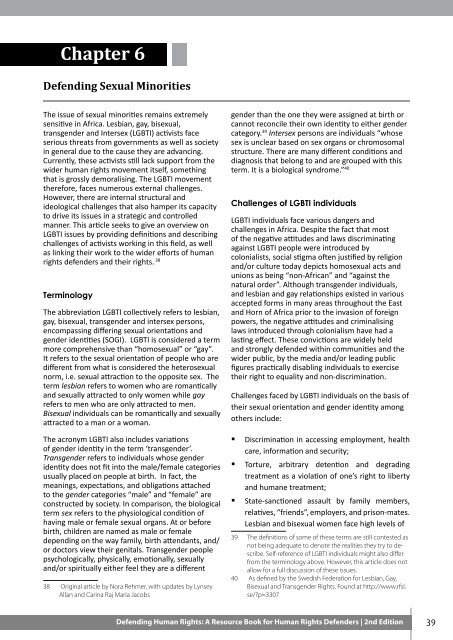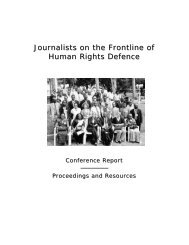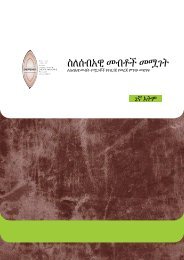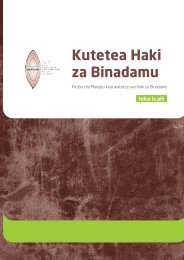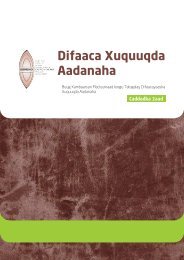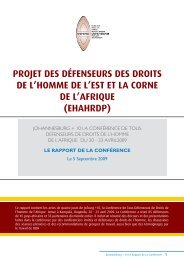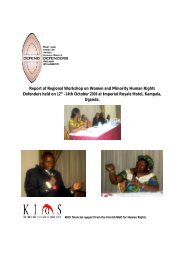Defending Human Rights: A Resource Book for Human
Defending Human Rights: A Resource Book for Human
Defending Human Rights: A Resource Book for Human
You also want an ePaper? Increase the reach of your titles
YUMPU automatically turns print PDFs into web optimized ePapers that Google loves.
Chapter 6<br />
<strong>Defending</strong> Sexual Minorities<br />
The issue of sexual minorities remains extremely<br />
sensitive in Africa. Lesbian, gay, bisexual,<br />
transgender and Intersex (LGBTI) activists face<br />
serious threats from governments as well as society<br />
in general due to the cause they are advancing.<br />
Currently, these activists still lack support from the<br />
wider human rights movement itself, something<br />
that is grossly demoralising. The LGBTI movement<br />
there<strong>for</strong>e, faces numerous external challenges.<br />
However, there are internal structural and<br />
ideological challenges that also hamper its capacity<br />
to drive its issues in a strategic and controlled<br />
manner. This article seeks to give an overview on<br />
LGBTI issues by providing definitions and describing<br />
challenges of activists working in this field, as well<br />
as linking their work to the wider ef<strong>for</strong>ts of human<br />
rights defenders and their rights. 38<br />
Terminology<br />
The abbreviation LGBTI collectively refers to lesbian,<br />
gay, bisexual, transgender and intersex persons,<br />
encompassing differing sexual orientations and<br />
gender identities (SOGI). LGBTI is considered a term<br />
more comprehensive than “homosexual” or “gay”.<br />
It refers to the sexual orientation of people who are<br />
different from what is considered the heterosexual<br />
norm, i.e. sexual attraction to the opposite sex. The<br />
term lesbian refers to women who are romantically<br />
and sexually attracted to only women while gay<br />
refers to men who are only attracted to men.<br />
Bisexual individuals can be romantically and sexually<br />
attracted to a man or a woman.<br />
The acronym LGBTI also includes variations<br />
of gender identity in the term ‘transgender’.<br />
Transgender refers to individuals whose gender<br />
identity does not fit into the male/female categories<br />
usually placed on people at birth. In fact, the<br />
meanings, expectations, and obligations attached<br />
to the gender categories “male” and “female” are<br />
constructed by society. In comparison, the biological<br />
term sex refers to the physiological condition of<br />
having male or female sexual organs. At or be<strong>for</strong>e<br />
birth, children are named as male or female<br />
depending on the way family, birth attendants, and/<br />
or doctors view their genitals. Transgender people<br />
psychologically, physically, emotionally, sexually<br />
and/or spiritually either feel they are a different<br />
38 Original article by Nora Rehmer, with updates by Lynsey<br />
Allan and Carina Raj Maria Jacobs<br />
gender than the one they were assigned at birth or<br />
cannot reconcile their own identity to either gender<br />
category. 39 Intersex persons are individuals “whose<br />
sex is unclear based on sex organs or chromosomal<br />
structure. There are many different conditions and<br />
diagnosis that belong to and are grouped with this<br />
term. It is a biological syndrome.” 40<br />
Challenges of LGBTI individuals<br />
LGBTI individuals face various dangers and<br />
challenges in Africa. Despite the fact that most<br />
of the negative attitudes and laws discriminating<br />
against LGBTI people were introduced by<br />
colonialists, social stigma often justified by religion<br />
and/or culture today depicts homosexual acts and<br />
unions as being “non-African” and “against the<br />
natural order”. Although transgender individuals,<br />
and lesbian and gay relationships existed in various<br />
accepted <strong>for</strong>ms in many areas throughout the East<br />
and Horn of Africa prior to the invasion of <strong>for</strong>eign<br />
powers, the negative attitudes and criminalising<br />
laws introduced through colonialism have had a<br />
lasting effect. These convictions are widely held<br />
and strongly defended within communities and the<br />
wider public, by the media and/or leading public<br />
figures practically disabling individuals to exercise<br />
their right to equality and non-discrimination.<br />
Challenges faced by LGBTI individuals on the basis of<br />
their sexual orientation and gender identity among<br />
others include:<br />
• Discrimination in accessing employment, health<br />
care, in<strong>for</strong>mation and security;<br />
• Torture, arbitrary detention and degrading<br />
treatment as a violation of one’s right to liberty<br />
and humane treatment;<br />
• State-sanctioned assault by family members,<br />
relatives, “friends”, employers, and prison-mates.<br />
Lesbian and bisexual women face high levels of<br />
39 The definitions of some of these terms are still contested as<br />
not being adequate to denote the realities they try to describe.<br />
Self-reference of LGBTI individuals might also differ<br />
from the terminology above. However, this article does not<br />
allow <strong>for</strong> a full discussion of these issues.<br />
40 As defined by the Swedish Federation <strong>for</strong> Lesbian, Gay,<br />
Bisexual and Transgender <strong>Rights</strong>. Found at http://www.rfsl.<br />
se/p=3307<br />
<strong>Defending</strong> <strong>Human</strong> <strong>Rights</strong>: A <strong>Resource</strong> <strong>Book</strong> <strong>for</strong> <strong>Human</strong> <strong>Rights</strong> Defenders | 2nd Edition 39


